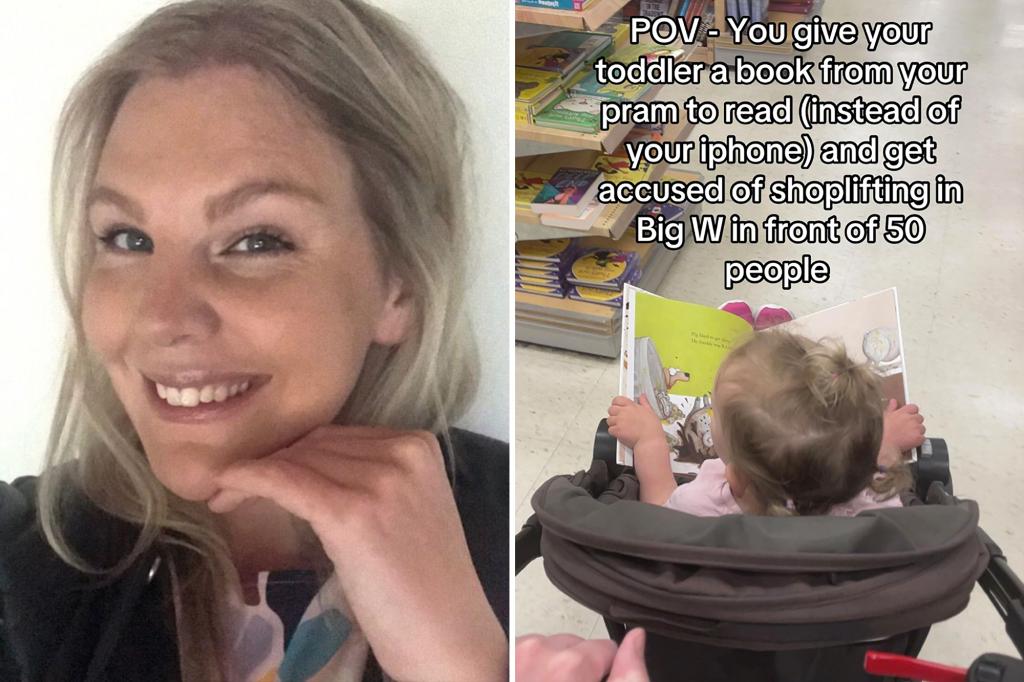The Embarrassing Reality of Store Alarms for Parents
We’ve all experienced that heart-stopping moment when store alarms blare as we exit, despite knowing we’ve done nothing wrong. That sudden rush of embarrassment and panic is universal, as we frantically search through our belongings for the culprit or fumble for a receipt to prove our innocence. For parents with young children, these moments can be particularly mortifying, as one Australian mother recently discovered. Jessica Mendes took to TikTok to share her humiliating experience at a Big W store, where she was publicly accused of theft simply for bringing her toddler’s book from home. Her story has resonated with parents everywhere who face similar judgments and suspicions while shopping with children.
Jessica explained that instead of giving her toddler a phone for entertainment during shopping, she brought a book from home. What should have been a responsible parenting choice turned into a nightmare when store alarms sounded as they tried to leave. In front of approximately fifty onlookers, staff demanded she empty her stroller and produce receipts. “When I say my soul left my body after being stopped and asked to come back, empty the pram and show four different receipts in front of so many shocked onlookers, believe me,” Jessica shared. Initially, staff accused her of stealing the book because it appeared “so shiny and new,” though it later turned out that a jumper from Target with its security tag still attached had triggered the alarm. The public nature of the accusation left Jessica questioning whether she should simply revert to letting her child use a smartphone during shopping trips.
The incident highlighted a disturbing reality for many parents: shopping with children, especially in strollers, often invites heightened scrutiny and suspicion from store staff. Jessica’s TikTok post quickly filled with comments from other parents sharing similar experiences of being profiled or treated like potential thieves. One mother described being asked to remove her baby from the stroller so staff could check underneath for concealed merchandise. Another parent, who identified as a person of color, confessed, “I’m a brown person with a newborn and I no longer go to Big W alone. I take hubby with so he pushes a trolley while we shop.” These testimonials reveal how routine shopping trips can become sources of anxiety and humiliation for parents, particularly those from marginalized communities who may face additional prejudice.
The experience of being falsely accused creates lasting emotional impacts that extend beyond the immediate embarrassment. For Jessica and others in similar situations, these incidents can lead to avoiding certain stores altogether or changing how they parent in public spaces. Some parents admitted they now give in to using digital devices for their children’s entertainment, despite their preference for books or other non-screen activities, simply to avoid drawing attention or suspicion. This represents a troubling choice that no parent should have to make: risk public humiliation or compromise on parenting values. The scrutiny placed on parents shopping with children in strollers creates an unfair burden, especially when those parents are trying to engage their children with books and other educational materials rather than digital screens.
Fortunately, the community of parents responding to Jessica’s video offered practical solutions rather than just sympathy. Many suggested creative ways to clearly identify personal belongings to prevent similar misunderstandings in the future. One parent recommended creating a designated “go bag” with all items labeled with the child’s name, even writing personal notes inside book covers as further proof of ownership. Others suggested taping receipts to the backs of books or adding personalized stickers to make it evident the items weren’t store merchandise. These community-sourced solutions demonstrate how parents must often develop their own strategies to navigate systems that seem designed to view them with suspicion rather than support them in their parenting journey.
This incident raises important questions about how retail environments can better accommodate families and avoid creating unnecessarily stressful experiences. While security measures are certainly necessary for businesses, the current approach often creates hostile shopping environments for parents with young children. Stores might consider implementing family-friendly policies that balance security needs with respect for customers, particularly those shopping with children. This could include training staff to approach potential security concerns with more discretion and sensitivity, especially when children are present. As Jessica’s experience shows, current practices can leave parents feeling criminalized for making choices in their children’s best interests, such as opting for books over screens. A more thoughtful approach would recognize that supporting parents, rather than treating them with suspicion, ultimately creates better shopping experiences for everyone involved.


